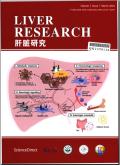Autophagy modulates physiologic and adaptive response in the liver
IF 2.1
Q2 Medicine
引用次数: 0
Abstract
Autophagy is a physiological process that is ubiquitous and essential to the disposal or recycling of damaged cellular organelles and misfolded proteins to maintain organ homeostasis and survival. Its importance in the regulation of liver function in normal and pathological conditions is increasingly recognized. This review summarizes how autophagy regulates epithelial cell- and non-epithelial cell-specific function in the liver and how it differentially participates in hepatic homeostasis, hepatic injury response to stress-induced liver damage such as cholestasis, sepsis, non-alcoholic and alcohol-associated liver disease, viral hepatitis, hepatic fibrosis, hepatocellular and cholangiocellular carcinoma, and aging. Autophagy-based interventional studies for liver diseases that are currently registered in clinicatrials.gov are summarized. Given the broad and multidirectional autophagy response in the liver, a more refined understanding of the liver cell-specific autophagy activities in a context-dependent manner is necessary.
自噬调节肝脏的生理和适应反应
自噬是一种普遍存在的生理过程,对于处理或回收受损的细胞器和错误折叠的蛋白质以维持器官的稳态和生存至关重要。它在正常和病理条件下调节肝功能的重要性日益被认识到。本文综述了自噬如何调节肝脏上皮细胞和非上皮细胞特异性功能,以及它如何以不同的方式参与肝脏稳态、肝损伤对应激性肝损伤的反应,如胆汁淤滞、败血症、非酒精性和酒精相关肝病、病毒性肝炎、肝纤维化、肝细胞癌和胆管细胞癌以及衰老。总结了目前在clinatrials .gov上注册的基于自噬的肝脏疾病介入研究。鉴于肝脏中广泛且多向的自噬反应,以上下文依赖的方式更精细地了解肝细胞特异性自噬活动是必要的。
本文章由计算机程序翻译,如有差异,请以英文原文为准。
求助全文
约1分钟内获得全文
求助全文

 求助内容:
求助内容: 应助结果提醒方式:
应助结果提醒方式:


